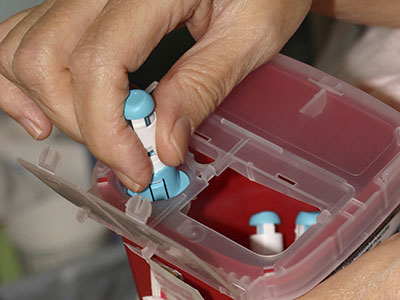Medical Waste Disposal in Ohio

Medical Waste Disposal in Ohio
Covered by our Brooklyn Heights and Columbus, Ohio Branches:
BioServ expanded our services to cover Ohio in 2017, as we saw the state’s need for an alternative to high-priced national providers. Our customers span a variety of industries and practice sizes—but for all of them, a reliable hazardous waste service is crucial for keeping business running smoothly. That’s why we designed our medical waste disposal services to be completely hassle-free, with automatic & on-call pickup options, flexible scheduling, and affordable, upfront pricing. Whether you generate large volumes or require medical waste services with specialized handling, we can handle your most complex needs. All across the Buckeye State—from Hudson, Delaware, and Columbus to Cleveland, Akron, and Cuyahoga Falls—customers rely on us for customized medical waste management solutions at affordable prices.
Request a FREE quote
Why Choose Us
-
Dedicated Customer Service
One of our experienced staff members is always available to answer questions or solve a problem.
-
No-Hassle
Call it in, fax it in or order online. Any way you choose, it will be simple and won't waste your valuable time.
-
Competitive Pricing
On average, customers are seeing a cost savings of 50% or greater.
-
Customized Plans
From medical, hazardous, pharmaceutical, and electronic regulated waste, BioServ can handle all your biomedical needs.
BioServ Serves All of Ohio, Including:
- Akron
- Hudson
- Cleveland
- Columbus
- Delaware
- Cuyahoga Falls
Guidelines for Small Quantity Generators of Medical Waste in Ohio
In Ohio, any business that generates less than 50 pounds of infectious waste per calendar month is classified as a Small Quantity Generator (SQG). For the many practices and facilities considered SQGs, knowing and abiding your generator status limits is critical. Exceeding the limit will force a change to your generator status–leading to additional reporting, time, and expenses.
Small generators are required to maintain a monthly waste generation log tracking the weight of infectious waste generated in each calendar month. However, this log is not necessary if the waste is sent to a licensed infectious waste treatment facility through a DOT-licensed and properly insured transporter (like BioServ). In this case, you simply need to keep your waste shipping papers.
To satisfy Ohio's recordkeeping requirement, we provide an initial copy of a waste tracking manifest at the time of service. The final copy is upload to your secure online client portal within 30 days. Whenever possible, we'll also work with you to ensure you maintain your current generator status.

Other OH Medical Waste Regulations
- Infectious Waste Definition Infectious waste includes cultures and stocks of infectious agents and associated biological, human blood and blood products, and substances exposed to, contaminated with, or likely to transmit an infectious agent or zoonotic agent.
- Infectious Waste Storage Infectious waste must be segregated from the rest of the waste stream; it must be kept in a marked or locked area with restricted access, with refrigeration if necessary, and must be protected from animals and insects.
- Disposal of Liquid / Semi-Liquid Infectious Wastes Untreated liquid infectious waste (blood, blood products, body fluids, excreta) may be disposed of into a sanitary sewer if allowed for the wastewater treatment system.
 OH Medical Waste Resources
OH Medical Waste Resources
- Ohio Environmental Protection Agency Website
- OH EPA: Infectious Waste
- OH EPA: Hazardous Waste Manifest Primer
- OH EPA: Large Generators of Infectious Waste (PDF)
- OH EPA: Small Generators of Infectious Waste (PDF)
- OH EPA Business Center: Register as a Generator of Infectious Waste
- OH EPA: Division of Materials and Waste Management
- Full text of OH's Solid Waste and Infectious Waste Regulations (Ohio Administrative Code, Chapter 3745-27)
- Full text of OH's Solid & Hazardous Wastes Regulations (Ohio Administrative Code, Chapter 3734)








